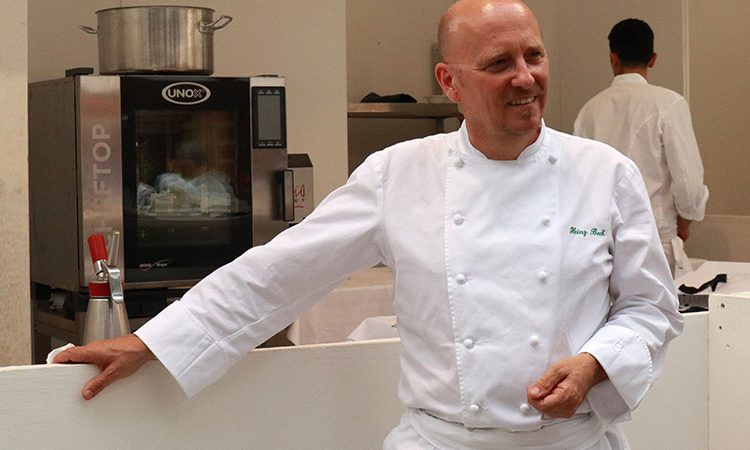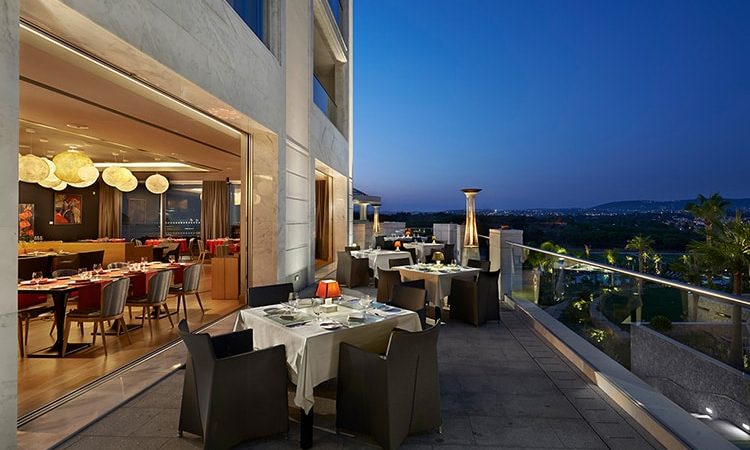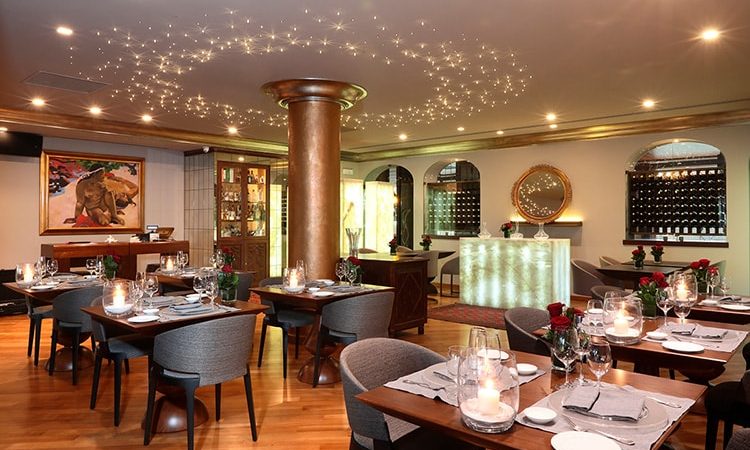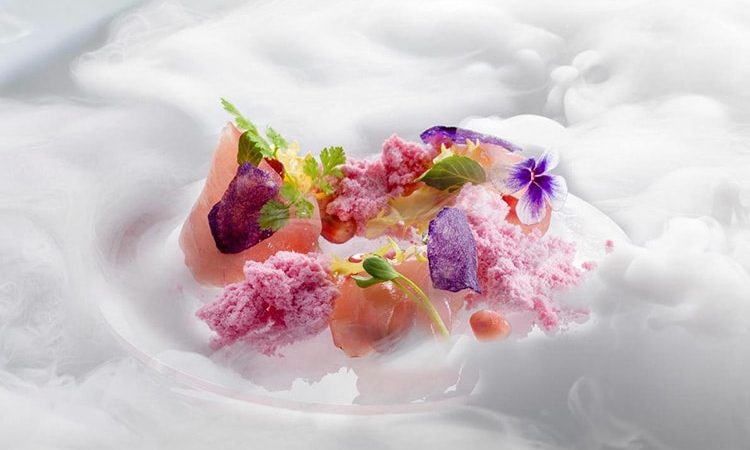Interview with The Master.
We couldn’t choose a better way to celebrate the first six months of a web magazine focused on excellence as iBESTmag is, than the interview we proudly offer today, to our loyal readers. Heinz Beck has been living for years in the Gotha of world food and never like this time we think that too many words of presentation are superfluous. We therefore limit ourselves to the essentials and then immediately move on to his long and fascinating interview by Daniela Barone.
Heinz Beck was born in Germany but now he feels Italian, since for more than twenty years he has been the Chef of “La Pergola”, the restaurant with 3 Michelin Stars (unique in Rome) of the Rome Cavalieri Warldorf Astoria. He has received countless awards and honors that certify him as a star of the first magnitude in the panorama of world renowned restaurants. His style is formed by Teutonic rigor and precision, skillfully combined with imagination and creativity. Many are now his restaurants, as well as the collaborations (project Season) with prestigious and exclusive hotels in Italy and in the world. Attentive to traditions, health and well-being, he collaborates on various food projects with prestigious Universities and Organizations. He is also the author of numerous and highly appreciated books.
Interview by Daniela Barone
Thank you Master Heinz Beck for your time
Q) For your personal and innovative way of conceiving food, harmoniously combining lightness, originality, taste and aesthetics, can we consider You the creator of ‘New Frontiers’ in the restaurant food world?
A) Thank you for your esteem and high consideration; personally, I continue to see myself as a craftsman who is fortunate to have wonderful raw materials available and lives an era where innovative techniques help to create good and healthy dishes.
Q) You are inspired by the Mediterranean cuisine, in your creations is it possible find traces of the Italian ‘poor kitchen’, especially that of southern Italy?
A) Southern cuisine, in particular the Sicilian cuisine, find space in my reinterpretations and in my modern interpretation of the dishes and I have the utmost respect for the so-called poor kitchens as they represent the bases from which great gastronomic traditions have developed, in Italy, but not only.
Q) How is a new dish born? Does vision precede creation or certain ingredients suggest a new idea?
A) Both things. Basically, I am inspired by the reality that surrounds me; it can be a song, a work of art, a conversation from which the idea springs. Sometimes I imagine the dish and start to study combinations and techniques with which to achieve what I have in mind; at other times I take inspiration from an ingredient and look for the healthiest and most balanced way to enhance it, without renouncing taste.
Q) La Pergola, the famous three Michelin Star restaurant, at the Hotel Rome Cavalieri, at Waldorf Astoria Resort, is a place of perfection that excelled charm and sensations make it truly unique and also boasts one of the most beautiful views of Rome. What is your relationship with this city?
A) Immense, in terms of love and gratitude. Rome is my city; as I often say, you can not choose where to be born, but where to live, yes. I made my choice 24 years ago: I came to Rome for the first time when I proposed the management of La Pergola; I fell in love with the restaurant, the view and threw my heart over the obstacle, starting from scratch in a country where I did not know the language. Rome welcomed me as a citizen and as a Chef; it is here that I met my wife: Rome is home.
Q) You have left Germany and have lived in Italy for a long time, do you think that the Italian life style has a universal value and is an example for other cultures? We refer to the value of the family where food also has an affective meaning, and naturally to the great variety of ingredients and for raw materials that Italy has.
A) Take care: when you say Italy, a smile opens immediately and your eyes light up. I do not know anyone who does not like our country. It is a precious commodity, from all points of view; it is up to us to keep it, to commit ourselves to fix what is wrong and to promote Italy abroad. From the eno-gastronomic point of view and the variety of raw materials available, then, we are truly unbeatable. It is right and proper to make known the many aspects of Italian culture in the world and be proud of it.
Q) Healthy eating is a priority, how can you combine flavors and lightness? A skilful use of condiments and ingredients or even new alternative cooking techniques?
A) The basic principle of my dishes is “less is more”; few condiments to bring out the excellence of raw materials and their properties. It seems simple, but it is not. We need a very deep knowledge of each raw material, the techniques and the modern instruments we can use. It is a constantly evolving profession and it is necessary to study. Always.
Q) Creativity, inventiveness, precision and a certain rigor are certainly your qualities, are you an ‘artist who decided to be a chef? Can you define it this way?
A) I would say so .. I think I always had a certain propensity to art, so much so that, as a boy, I would have wanted to enroll in the Academy to become a painter. My family did not agree, so I had to find a professional alternative that would allow me to combine work and artistic inspiration .. and so I opted for the Hotel Institute, kitchen branch.
Q) When you are not in your restaurants or you are traveling, what do you prefer to taste?
A) Fruits and vegetables are never lacking. In general, I love simple foods. A good pizza margherita, a plate of pasta with fresh tomatoes and basil or even a simple minestrone make me happy.
Q) Do you remember a particular lunch of your childhood?
A) One in particular, no, but I remember the holidays spent in the family, where there was never lacked of goose with red cabbage.
Q) At the beginning of your activity, was there a dish, a preparation with which you understood that you were facing a turning point in your life as a Chef?
A) I still remember the mix of fear and hope when I presented the Fagottelli La Pergola to the press and to the Roman public .. I had been here for a very short time and in practice I started, as a Chef, revisiting a classic of the Capitoline cuisine. I took a big risk ..
Q) Do you personally choose your collaborators among the young chefs apprentices? What relationship do you have with them, do they fear you ? 🙂 What suggestion can you give to those who start training in this profession?
A) The collaborators, for all the restaurants that I manage with my wife with our B & M Consulting Company, are selected by me. I’m feared, I think it’s normal, but at the same time I try to dose rigor and indulgence. There are times when you are joking and, most, moments when you need maximum concentration. I am open to dialogue and comparison, but in the kitchen, the last word is up to me.
Q) Are your restaurants located in many locations around the world, from Rome to Taormina, from London to Dubai and others, does the proposals menu varies from place to place, from territory to territory and compares with local tastes?
A) Absolutely. Basically, in all my restaurants I propose a Mediterranean cuisine, favoring Italian raw materials. Each menu is then studied and adapted according to local ingredients and local tastes, as well as a dish designed, for example, in Tokyo, to enter paper in one or more of the other structures and vice versa.
Q) Your activity require a perfect organization, how do you manage and coordinate with your collaborators in your many restaurants?
A) It is rather demanding. From Tuesday to Saturday I’m in La Pergola. It happens that during the day I visit restaurants in Italy and come back in the evening, in time for the service. For my restaurants abroad, Portugal, Japan and Dubai, I take advantage of the closing days at La Pergola to plan my travels and limit my absences from the restaurant. I also plan frequent Skype calls with my staff to discuss reservations, feedback and all other issues. I also asked for live streaming cameras to follow my employees in the kitchens and give them directions.
Q) If you have free time, what do you like to do?
A) I rarely have free time now; when it happens, I try to spend as much time as possible with my wife. We like going for walks, going to the opera or the cinema and visiting museums.
Q) Have you ever dedicated and created a plate just for a woman, his wife?
A) Not yet, but, if it should happen, it will have to be the best dish I’ve ever made.
Q) The Best of Heinz Beck ..? (from any point of view) 🙂
A) My staff.
– La Pergola – Waldorf Astoria Cavalieri – Rome
– Café Les Paillotes – Pescara
– Gusto by Heinz Beck – Algarve (Portugal)
– Social Heinz Beck – Waldorf Astoria Dubai Palm Jumeirah
– Heinz Beck – Tokyo
– Attimi by Heinz Beck – L. da Vinci Airport (Rome)
Altri, dal Project Season:
– St. George restaurant by Heinz Beck @ Ashbee Hotel – Taormina
– Beck at Brown’s @ Brown’s Hotel – London
– Ruliano with Heinz Beck @ FICO – Bologna
Texts & Interview © iBESTmag/Daniela Barone – Images Courtesy by Heinz Beck – © InterMedia Japan, Janez Puksic, Antonio Saba, Donato Mauro Advance Visual Comunication, Hotel Photography, Nakasa & Partners – Reproduction Forbidden













